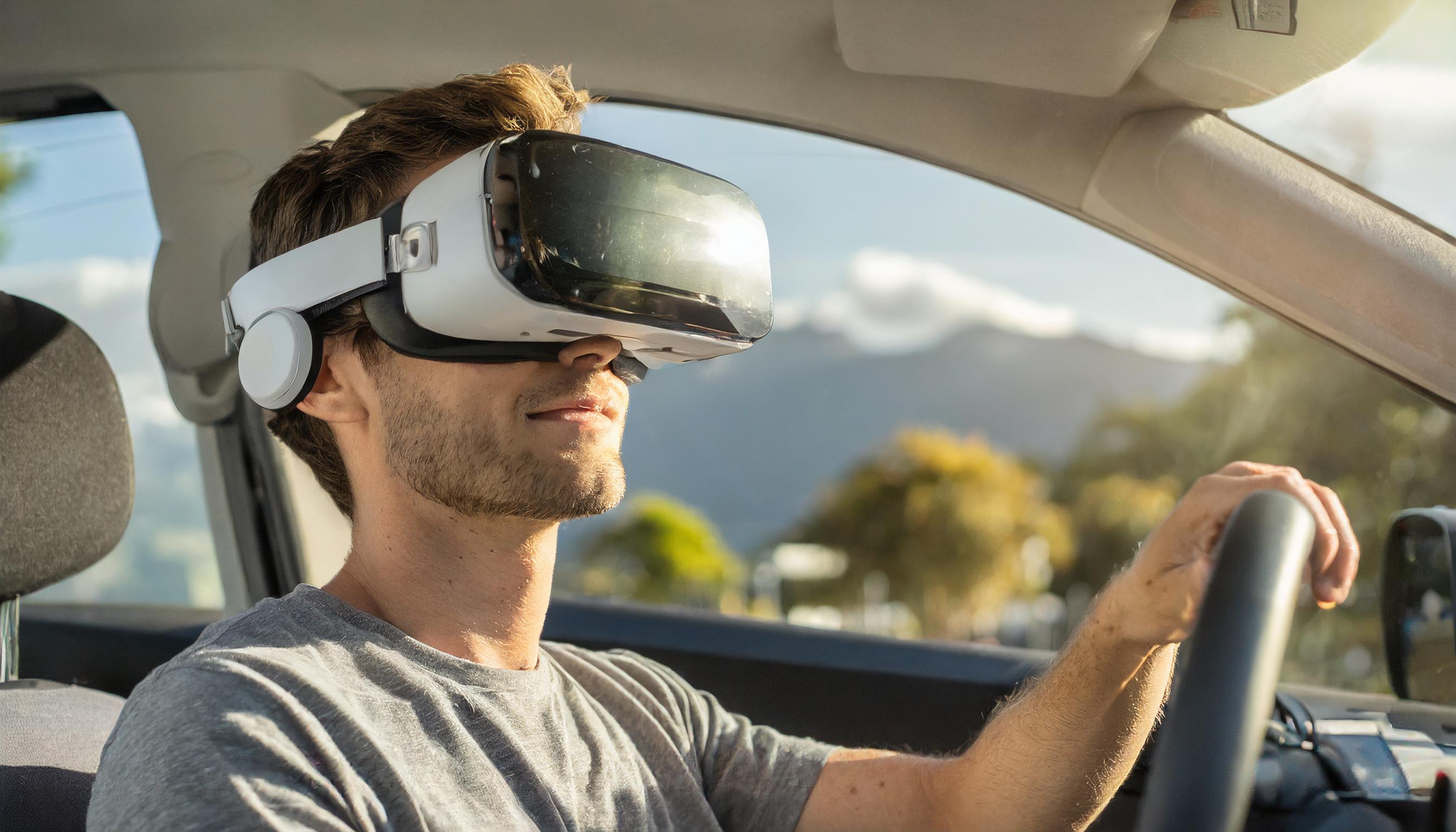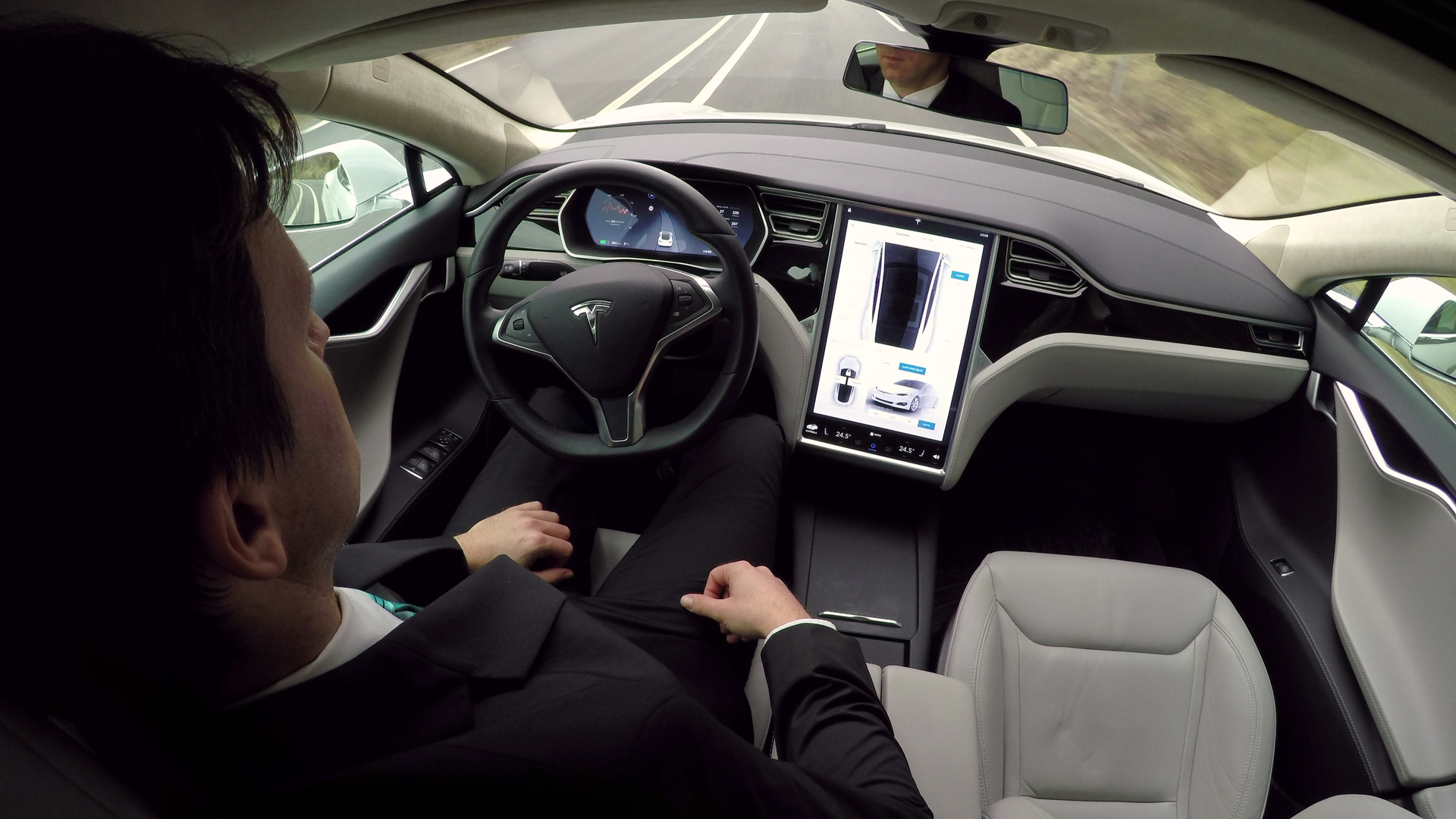Is it actually illegal to drive while wearing an Apple Vision Pro? Surprisingly, it's complicated
Driving laws need to catch up fast with tech like the Vision Pro

Sign up for breaking news, reviews, opinion, top tech deals, and more.
You are now subscribed
Your newsletter sign-up was successful
You've probably seen the viral videos this week showing some Apple Vision Pro users wearing their headsets while behind the wheel of cars like the Tesla Cybertruck. These early adopters have been taking advantage of Tesla’s Autopilot and Full Self-Driving Capability while doing so – and while that's clearly irresponsible, the laws on doing it are surprisingly vague.
So far, there have been at least three prominent viral videos that show people in control of a moving Tesla, while wearing and apparently interacting with the Apple Vision Pro headset. Naturally, it has drawn heavy criticism from fellow social media users, as well as government officials and road safety advocates.
The US Secretary for Transport Pete Buttigieg posted on X (formerly Twitter) to say that "all advanced driver assistance systems available today require the human driver to be in control and fully engaged in the driving task at all times".
Reminder—ALL advanced driver assistance systems available today require the human driver to be in control and fully engaged in the driving task at all times. pic.twitter.com/OpPy36mOgCFebruary 5, 2024
A National Highway Traffic Safety Administration spokesperson also told Fortune in a statement that "driving while wearing a VR headset is reckless and disregards the safety of everyone on the road". They added that "all vehicles with advanced driver assistance systems require a fully attentive human driver" who is "monitoring the surrounding environment at all times".
Naturally, Apple's own guidelines also confirm that drivers shouldn’t be using its mixed-reality headset while piloting a potentially deadly weapon. They state that you should "never use Apple Vision Pro while operating a moving vehicle, bicycle, heavy machinery, or in any other situations requiring attention to safety."
But despite all of this, the actual laws around driving while wearing a mixed-reality headset like the Apple Vision Pro remain murky. As Joseph Young from the Insurance Institute for Highway Safety (IIHS) told us "whether it’s technically illegal [to use a Vision Pro while driving] would depend on specific state laws". Vehicles with level 2 partially automated driver assistance systems aren't self-driving, so "any laws related to driver distraction or vehicle control would apply". But what exactly are those laws?
What are the actual laws?
Many US states have broad laws covering the use of electronic devices while driving. For example, a total of 27 states have an outright hand-held cellphone use ban, while other states make it illegal to send text messages when driving. But "whether a headset is specifically banned may depend on how electronic devices are defined" Joseph Young from the IIRC explained.
Sign up for breaking news, reviews, opinion, top tech deals, and more.
In some states and districts, it's fairly clearcut. For example, Connecticut, D.C. Washington, and Wisconsin, define 'distracted' as anything that diverts the driver’s attention from driving the vehicle. As Joseph Young commented "I think it’s fair to say this behavior [driving while wearing a Vision Pro] would fall in that category".
But in other states, the laws contain potential loopholes and need to catch up with modern tech. Eight states ban watching videos under their electronic device laws, but it isn't clear whether this applies to a mixed-reality headset's passthrough.

Similarly, 35 states have laws that prohibit screens in the driver's line of sight, but this is limited to watching television, as opposed to streaming from the internet – so there are legal loopholes that drivers can potentially exploit.
In short, it's complicated and not as clearcut as you might think. In the UK, laws prohibit holding and using a phone, sat nav, tablet, or any device that can send and receive data while driving or riding a motorcycle.
Although mixed-reality headsets aren't mentioned specifically, the Road Traffic Act 1988 in the UK states that a person is guilty of an offense if they do not "give proper control or a full view of the road and traffic ahead, and this applies also to the use of mobile phones or other devices whilst driving." So this would likely apply to anyone thinking of using an Apple Vision Pro, or other mixed-reality headsets, while driving.
Driving laws need to catch up
Although it is unclear whether the latest viral videos led to any arrests or citations, it is glaringly obvious that laws surrounding the use of technology while driving are in desperate need of an overhaul – or at least clarification.
Currently, there is already great confusion around autonomous driving systems, with some owners believing it means they can take hands off the wheel and eyes off the road. It is the reason Tesla landed itself in hot water recently, with accusations of confusing claims surrounding the capabilities of its Autopilot and Full Self Driving technology.
Even BMW and Mercedes-Benz, both of whom offer the most advanced levels of automation in Europe, state that the driver must be ready to take over any minute. Dig a little deeper into guidelines, and 'eyes off the road' can only really happen in low-speed traffic jam situations on highways and motorways with structurally separated carriageways.

Independent organizations like the Insurance Institute for Highway Safety think vehicles need to be rejigged as much as the distracted driving laws. "These are not self-driving cars, yet our research has found that many users of these systems are comfortable treating them as such", said Joseph Young. "We want to see multi-modal driver monitoring systems, escalating attention reminders, and intentional system limitations designed to promote shared responsibility," he added.
With more automotive manufacturers adding increasing levels of automation and additional screens into cars, as well as streaming and gaming capabilities via touchscreen infotainment systems, it appears driver distraction is at its most tempting to date.
The recent Apple Vision Pro debacle is just another example of why legislation desperately needs to catch up with advances in technology. While it may seem jaw-droppingly obvious to most that it is a silly idea, without the full force of the law condemning such behavior, unfortunately it’s likely to happen again.
You might also like

Leon has been navigating a world where automotive and tech collide for almost 20 years, reporting on everything from in-car entertainment to robotised manufacturing plants. Currently, EVs are the focus of his attentions, but give it a few years and it will be electric vertical take-off and landing craft. Outside of work hours, he can be found tinkering with distinctly analogue motorcycles, because electric motors are no replacement for an old Honda inline four.
- Mark WilsonSenior news editor